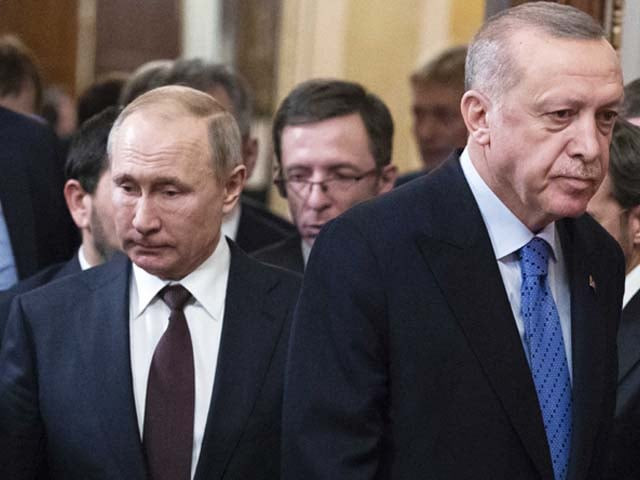The speculation presently sweeping the Alt-Media Community this week is that Russia’s massive anti-militant strike in Syria’s Idlib was a message meant to deter any Turkish intervention in Azerbaijan’s on-going counteroffensive against Armenian forces and their allied separatists in Nagorno-Karabakh. The narrative being pushed is that Russia is extremely unhappy with Turkey’s reported military assistance to Azerbaijan and unconfirmed reports (both vehemently denied by Ankara and Baku) that it’s facilitating the flow of Syrian militants to the front lines there. There’s some truth to the optics, but the substance is certainly debatable.
Russian officials, most notably head of foreign intelligence Naryshkin, recently claimed that Syrian and Libyan militants had entered the conflict zone in Azerbaijan’s support, strongly hinting that Turkey facilitated their transfer. Thus far no evidence to that effect has been made public, but it can be presumed that all sides are discussing this issue behind closed doors. Public opinion in Russia is also sympathetic to Armenia because of that diaspora’s successful lobbying efforts to emphasise both sides’ shared Christian connections. Still, the Kremlin hasn’t hinted that it has any intent to launch a foreign military intervention there in their support.
The reason for this is pure pragmatism. Although Russia and Turkey veritably compete in certain areas of the world where their initial interests contradicted one another, they’ve made great efforts to reach mutual understandings with one another in order to avoid worsening any “security dilemma” between them that could then be exploited by a hostile third party such as the US. The Astana peace process in Syria and less prominent talks on Libya are relevant examples. Furthermore, Russia officially regards Nagorno-Karabakh and its seven surrounding districts as being under illegal Armenian military occupation per four UNSC Resolutions.
It can be argued that Russia might have struck the Turkish-backed militant camp in Idlib in order to send a message to Turkey about the consequences that could befall its proxies if it allegedly sends them to Azerbaijan, but it can also be just as equally argued that the latest strike had everything to do with the worsening ceasefire situation in Syria and nothing at all to do with Nagorno-Karabakh. As statisticians are always fond of saying, correlation doesn’t mean causation, and the timing of this attack might not be connected to any conflict outside of Syria’s borders at all.
Just like Russia and Turkey have sought to reach a pragmatic series of compromises in Syria, so too might they be seeking to do the same in more informal matter concerning Azerbaijan’s counteroffensive. Neither Great Power wants to face off against the other and risk any potential hostilities quickly escalating into a CSTO-NATO war. Nevertheless, as touched upon earlier, there are certain lobbying forces that are desperate to see that happen, especially over Nagorno-Karabakh. They’re not just the most passionate members of the Armenian diaspora either, but also those who have an intense dislike for President Erdogan and Turkey in general.
Their end goal is for Russia to militarily intervene on Armenia’s side by bombing Azerbaijani military positions on the pretext of targeting foreign militants, which would in turn trigger a Turkish reaction that would likely lead to the earlier mentioned CSTO-NATO war. These lobbying forces have no means of shaping Russian decision-making simply by speculating that its latest anti-militant strike in Idlib was intended as a message to Turkey in Azerbaijan, but pushing this narrative could still confuse the masses and lead to distrust between their people, which they hope will increase grassroots and lobbying pressure on the Russian government in time.
As it stands, though, there’s no reason to believe that such a dark scenario will transpire. The Azerbaijani military is successfully liberating increasingly larger swaths of their land by the day so the strategic window of opportunity for any speculative Russian anti-militant intervention there has considerably narrowed to the point where it probably wouldn’t accomplish all that much even if it’s “contained” (i.e. Turkey doesn’t intervene too). It might be fun for some of the most passionate anti-Turkish observers to imagine that President Putin was sending a message to President Erdogan with the latest Idlib strike, but it’s extremely unlikely that he was.



COMMENTS
Comments are moderated and generally will be posted if they are on-topic and not abusive.
For more information, please see our Comments FAQ